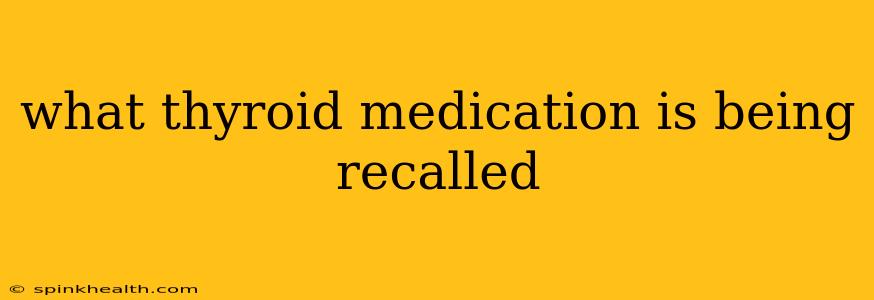What Thyroid Medication is Being Recalled? A Look at Recent Issues
The news of a thyroid medication recall can be alarming, especially for those who rely on these crucial medications to manage their health. Let's delve into this important topic, clarifying the situation and addressing common concerns. It's crucial to understand that recall information changes frequently, so always check directly with the FDA or your pharmacy for the most up-to-date details.
This isn't a simple answer, as there isn't one single thyroid medication consistently under recall. Recalls happen periodically for various reasons, and the specific medication involved varies. Sometimes, it's due to manufacturing defects, contamination, or inconsistencies in potency. Other times, recalls might be precautionary, based on potential issues discovered during routine quality checks.
The best way to stay informed is to regularly monitor the official website of the Food and Drug Administration (FDA) in your country. They maintain comprehensive databases of all recalled medications, including details on the specific product, the reasons for the recall, and what actions patients should take.
How to Identify Recalled Medications:
Checking for recalls isn't a daunting task. Here's what you should look for:
- The FDA Website: The FDA website provides detailed recall information, often including lot numbers affected. Search by medication name or look for a specific recall notice.
- Your Pharmacy: Your pharmacist is a great resource. They can quickly check if your medication is subject to a recall.
- Medication Packaging: Carefully examine your medication packaging for any recall notices or warnings. These are usually clearly labeled.
- Email Alerts: Many pharmaceutical companies offer email alerts for recalls. Consider signing up for updates on the medications you use.
What Should I Do If My Thyroid Medication is Recalled?
If you discover that your thyroid medication is recalled, don't panic. Follow these steps:
- Contact Your Doctor: This is the most crucial step. Your doctor will advise you on the best course of action, including whether you need to switch medications or adjust your dosage. They can also discuss potential side effects and answer any concerns you have.
- Contact Your Pharmacy: Your pharmacist can help you return the recalled medication and obtain a replacement.
- Do Not Stop Taking Your Medication: Unless your doctor advises otherwise, do not suddenly stop taking your thyroid medication. Abrupt cessation can have serious health consequences.
What are the potential reasons for a thyroid medication recall?
Several factors can lead to a recall of thyroid medications:
- Manufacturing Defects: Issues during the production process can compromise the medication's quality or potency.
- Contamination: The medication may become contaminated with impurities or other substances.
- Inconsistent Potency: The active ingredient's concentration might not meet the required standards, leading to either under- or over-medication.
- Packaging Issues: Problems with packaging can affect the medication's stability or safety.
How can I reduce my risk of getting a recalled medication?
While you can't eliminate the risk entirely, you can minimize it by:
- Regularly checking the FDA's website: Stay informed about current recalls.
- Keeping your prescriptions up to date: Always inform your doctor and pharmacist of any changes to your health or medications.
Remember, the information provided here is for general knowledge and should not be considered medical advice. Always consult your healthcare provider or pharmacist for personalized guidance on thyroid medication and recalls. Proactive monitoring and communication are key to ensuring your safe and effective thyroid management.

